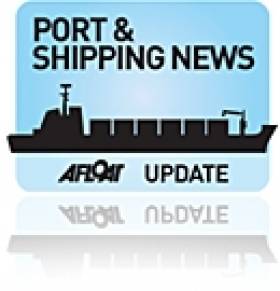Displaying items by tag: Rosslare Europort
Body of Woman Who Fell from Rosslare Ferry Recovered
The body of the woman who fell overboard from the Irish Ferries vessel Isle of Inis Mór was recovered from the sea at Rosslare on Saturday. According to media reports the woman fell overboard as the ferry approached Rosslare Europort shortly after 6am on Saturday. Her body was taken from the water about two hours later. Gardaí are not releasing her identity until family members were notified.
Rosslare Europort
Rosslare Europort
Rosslare-Europort is located on the south-eastern tip of Ireland, and is the closest point in the south of the country to the UK and continental Europe.
There are regular sailings to Fishguard (with Stena Line); to Pembroke, Cherbourg, and Roscoff (with Irish Ferries); to Cherbourg (with Celtic Link Ferries); and to Le Havre (with UECC).
Rosslare-Europort, being the closest point from the southern part of Ireland to the UK and the European Mainland, is a hub of all the major RORO Passenger and Freight services operating the southern Irish Sea and Continental routes.
Enquiries relating to timetables, rates, fares, etc. on existing services should be addressed directly to the relevant shipping line (contact information is available on their respective websites – see links below).
Ferry Reservations – Please visit our partner site, aferry.to, to find out about the route schedules and booking information.
Getting to/from Rosslare Harbour by Sea – There are regular services to Cherbourg, Fishguard, Le Havre, Pembroke, and Roscoff. Book a sailing here.
Getting to/from Rosslare Harbour by Rail – There is a railway station in the port itself, Rosslare-Europort station. There are services to Dublin, Waterford, Cork, Kerry, and Limerick. See Irish Rail's website for more information.
Getting to/from Rosslare Harbour by Bus – Bus Eireann provide good services at Rosslare, linking it with Dublin, Cork, Waterford, Wexford, and it is possible to get connecting buses from there to your final destination. For more information, see Bus Éireann's website.
Getting to/from Rosslare Harbour by Car – Rosslare Harbour is located on the N25 route, which runs across the south of the country, connecting Rosslare with Waterford and Cork. If travelling from Dublin, take the N11 south to Wexford, from where you can turn onto the N25 east to Rosslare Harbour. If hiring a car, check out our car hire guide.
Rosslare Harbour Accommodation – Please see our Rosslare Harbour Accommodation page.
More Information – Rosslare Europort is operated by Iarnród Éireann (Irish Rail), and more information can be found on their website.
Trade enquiries regarding port access, rates, etc. should be addressed to:
Rosslare Europort John P Lynch, General Manager Rosslare Europort, Iarnród Éireann, Terminal Building, Rosslare Europort, Co Wexford. Tel: +353 (0) 53 915 7970 , ax: +353 (0) 1 886 0511 , or email: [email protected]





























































